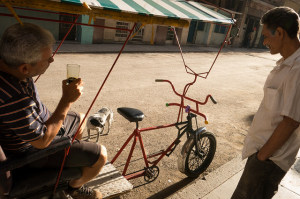The bike taxi is a popular means of transport in Cuba as it is human-powered and helps many people fight their difficult social situation. However, it has recently suffered great harm due to latest government measures, which have put in danger its further existence in the streets of Cuban towns.
A survey of several city districts and a number of interviews with bike taxi drivers have shown that this self-employment activity, legalized by the government within the process of the country’s economic opening (officially known as “modernization of the socialist model”), has been facing a great many obstacles.

Carlos, a 60-year-old bike taxi driver, believes that the recent measures only seek to destroy the bike taxi business. “All of us bike taxi drivers work without a licence. If you want to apply for a licence these days, you need to provide so much information and go through so many formalities that it’s simply impossible to comply with all the requirements. First, you have to undergo a comprehensive medical check-up, which involves a common medical examination as well as a blood test and a chest X-ray. I have no clue why they need it. Further, the drivers need to pass a driving course as if they were applying for a driving licence for a car. The examinations are tough, almost nobody passes them. In addition, the applicants are obliged to pay the same fee as private taxi drivers and private entrepreneurs. In the end, an application for a license needs to be filed with ONAT (National Tax Administration Office), followed by a strenuous procedure, after which the applicants are to wait at home until they get a response. None of them has received one yet, though.”
33-year old Papo, who works as a bike taxi driver in the district of Santa Fe, informed us about yet another requirement: all bike taxis need to be registered. Registration must be done in a State-run workshop in Bauta, where the vehicle obtains a registration number, which must be imprinted on the metal part linking the wheels with the handle bar and must be visible whenever the driver pedals the bike.
“Before being able to use the vehicle in a legal way, you must first assemble it, using your own resources – you must do the upholstering, buy the wheels, create the bodywork, register the bike and also, you must pay for the driving course. However, the licences are no longer issued now and the existing ones are not renewed as they say that the process has been stopped for the time being.”
Another bike taxi driver, who wished to remain anonymous, said: “The bike taxi is an environmentally friendly means of transport. It doesn’t run on fuel, so it doesn’t pollute the environment. Moreover, it helps people solve many problems. Early in the morning or at any other time when somebody knocks on the door, we are ready. We can take a patient to hospital, move a TV set or a washing machine, or anything else – bike taxis have even be used for moving beds! They are much cheaper than renting a car or a truck. Also, they are more convenient because they can get to places where no other vehicle fits in. How much can we earn a day? During the day we usually gain little, but in the evening and early in the morning, when there is no public transport, we can earn up to 130 or 150 pesos.”
Ramon, who drives one of the first bike taxis that appeared in Havana, showed me his licence, which expired three years ago. He admits that all bike taxi drivers are working illegally at present. “Right now there are thousands of bike taxis facing the same situation. We must remain vigilant at all times and when we hear somebody shouting ‘galeón!’ (“galleon”), we must run and hide. ‘Galeón’ is the nickname for the police truck, which often comes to make raids against us, to fine us and confiscate our vehicles. These police trucks are like an anthill – they are full of agents that quickly disperse through the streets to chase us, like in pirate films.”
“The difficult social situation forces many people to assemble a make-do vehicle and make their living pedalling the streets,” says 42-year-old Mario, who drives a bike taxi equipped with a music player. “Many of them are young people, who work instead of going to school, and that’s no good. Also, many people come to town from the country to work as bike taxi drivers. These days, there are over four hundred bike taxis only in the Playa municipality. None of them has a license and they can’t get one, anyway, as they are no longer granted. If the State wants to maintain law and order, why doesn’t it contribute to its establishment? I have a family and have my own equipment with which I make a living. If they confiscate it, what will I live of? Will I have to steal? No way! That’s something I would never ever do, but what about other people who found themselves in a similar situation? Will they think like me? In my opinion, the problem of the bike taxis is like a thermometer producing exact information about the willingness of the State to help fix things, or make them even worse.

Leave a comment